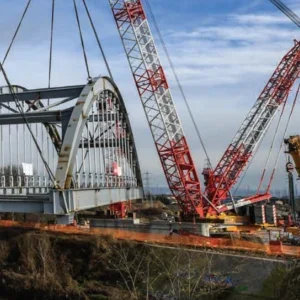For more than twenty years, a group of German special transport companies had worked side by side, competing for and trading jobs with each other. Each had some different specialities, and none was big enough to take every order. They would refer the customers to their local, or national rivals. “A couple of years ago, if you had a request to take an 80t load to Romania, you had to give the telephone number of another company,” says Horst Wallek, managing director of special transport firm Wallek. He is the first elected chairman of the special transport association BigMove, formed from 12 of these companies.
Before BigMove, a lot of orders were going to third parties,” Wallek says. “Now you can keep this incoming request inside the organisation.” These referrals – which make up about 10% of members’ business – are the core business advantage that BigMove member companies have over their local rivals. This cooperation is balanced with competition – members continue to fight with each other to win jobs. “There is competition. This is intended,” Wallek says. “With special transport and haulage, there are so many details that it is almost impossible to provide detailed rules. Therefore you have to negotiate with each other.
“Every company has similar equipment. Competition does exist; you can’t take it away,” Wallek says. “Every company has core competencies and a geographical base. It is not possible for each agent to have an exclusive geographical area. There are recommendations, the ones who have the better resources and are better able to do the job get the job.”
“We have to admit it was tough for former competitors to work together,” Wallek says. “The idea of BigMove is that if everybody only thinks about what he can get then the party is over. The idea of BigMove is for the member companies to think, ‘What can I give’. Member companies give and take jobs, but in the long run, they all gain from each others’ success, Wallek says.
“Before BigMove, we knew each other. We had hard business negotiations. We learned that Kreiling, for example, was good in pushing and pulling loads, and another company was good in something else. The end result is that there is a widespread service, and everybody knows what they can do.” He adds: “There are some types of work for which a company’s core competences are accepted by the BigMove group. Other types of work are not accepted by the group, and then we have to negotiate.”
There is nothing to stop a member company from taking business out of BigMove. “You can do whatever you want, it’s only about recommendations,” Wallek says. “But our experience over the years is that open communication finally delivers profits. When you go too much outside, the organisation notices.
“We have quarterly meetings of the directors, and an internal online forum, and things are discussed. If one company drags too much business out of BigMove, and doesn’t put enough in, there are internal discussions, and mostly solutions are found. It’s a good thing that in two and a half years we have been able to solve problems before they reached our internal court.
“The directors of the companies have a good nose for what the other directors are doing, and each has a large existing network in the market. If someone goes a bit queer, they notice. We need open communication. Sometimes it is a little bit like fighting or wrestling, but it always works out well in the end.
“We need a meeting every three months to discuss things. Annual meetings would not be sufficient. The meetings are hard, with twenty points on the agenda. It is not like going to a bar to drink a beer and say how hard the world is. If you can imagine these are 12 men who were formerly like regional kings. Now they have to sit together at one table, and deal with each other eye to eye.” A two-thirds majority (eight votes) carries most decisions.
Sharing and caring
The association itself actually has few resources – only a couple of secretaries. The rest of BigMove’s internal resources are shared among members. Some members share 25% of their dispatch employees’ time with BigMove. When it started, the organisation thought it would share a salesman, but that was not a success. “The poor guy – he had 12 bosses,” Wallek says. Following some difficult disputes, the group decided to decentralise sales. “The salesman lost his job, but he might have been glad to do some other work.” The association recommends prices with a standard spreadsheet job quotation tool – but prices do differ from one company to another. Members also share some financial data. There is a central office for applying for some road permits for a certain type of fleet trailers.
BigMove members band together for petrol, tyres and oil for shared projects, but generally use their own supply contracts for trucks or components. The group is also cooperating to improve the specification of the products that it buys – such as trailers.
“If you went to a producer, and asked for some customisations of one trailer, you would have no chance. But it might adjust its product lines for a special market effort and a group of 12 connoisseurs.” Since start up, group members have bought 75 standard trucks and trailers, and commissioned 40 customised special trailers, with two tenders out now.
“A few years ago, we submitted a design to two different trailer manufacturers, who both refused to make it. Finally a third made it for BigMove. After it went out to market, the first two constructed a similar one. It is the specialists in BigMove who have the market competence to go to constructors and get a good result. The manufacturers benefit as well.”
The association is moving toward standard components and modules to build trailer set-ups to allow engineers from one member company to be able to work on the equipment of another.
“BigMove has lots of synergies and know-how,” Wallek says. “Fleet trailers and standard products share drivers and maintenance routines. The more we get into a standardised fleet, the better we share know-how. The objective is to gain more synergies and more know-how.”
The association is moving toward a central planning organisation, and is planning a central equipment database and common vehicle tracking system. Some members now use a telematic map of BigMove trailers. “Dispatchers know that Gutmann (a member) has some trucks available, and Giebel (another member) has some trailers available, and that both will be in the area where they are needed,” Wallek says. A BigMove collaboration may combine the hardware from different companies for one client, beginning the trip in one combination, and ending up at the destination possibly in another combination.
The BigMove chairman, Horst Wallek, is now half-way through his five-year term. “The role of chairman is very important for internal affairs,” Wallek says, particularly for strategy and moderation. The chairman also heads the executive board that consists of head of technology Marlo Gutmann (of Gutmann), head of marketing and sales, Udo Roetzschke of Pallmann, head of finance Willi Geser (of Geser), and the auditor is Rainer Bloedorn.
Biannual meetings bring together dispatchers and engineers. Engineers also train together. “Internal communications are everything,” Wallek says. “The chairman, the engineer, the depot managers, all the special departments have to be involved to make the best synergy.” The group has considered growing, and has received requests to join from other companies in the area, but is taking such decisions slowly, Wallek says.
“It is like a marriage. You cannot just put up some written rules. You have to build up trust and communication. Will someone fit into the team? You have to find out in advance, and as you work together you can see what their education, and heart and brain, tell you. It’s the team that makes the result.”






